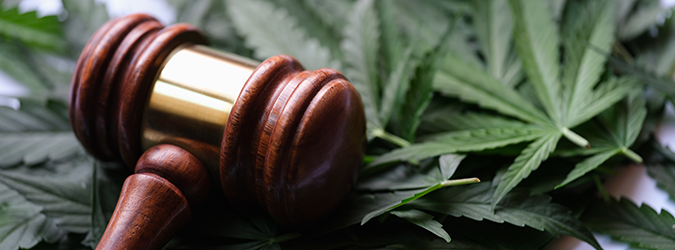Attorney Professionalism Forum: Recreational Marijuana
10.13.2021
To the Forum:
I am a commercial litigator who recently relocated from Georgia to New York. In my nearly 25 years of practice, I have counseled clients on a wide variety of matters related to business and personal needs. Recently, however, many clients have sought my counsel on issues related to recreational marijuana use and sales in an effort to comply with the recent improvements in state law. When practicing in Georgia, we were warned not to advise clients on this issue as it violated federal narcotics law.
A new and valuable client of mine in my New York practice recently sought my counsel on establishing a recreational marijuana business. In exchange for my advisement, the client offered me a 5% equity ownership interest in his cannabis business in lieu of payment for my legal fees. In addition, the client recommended that I sample the product prior to agreeing to the deal to ensure that I am fully informed and adequately invested. As I am new to this area of practice, I am hoping you can opine as to my ethical obligations with respect to this potential business venture to ensure that I do not run afoul of any of my obligations.
Sincerely,
Mary Jane Dazzled
Dear Mary Jane Dazzled,
We have previously attempted to help lawyers navigate through the minefield of the various applicable ethical rules and cannabis-related conflicting provisions of state and federal law in one of our prior Forums. See Vincent J. Syracuse, David D. Holahan, Carl F. Regelmann, and Alexandrea Kamenetsky Shea, Attorney Professionalism Forum, N.Y. St. B.J. July/August 2018, Vol. 90, No. 6. We cautioned at the time that this was a rapidly evolving area of the law. At the time that Forum was published, New York’s Compassionate Care Act was relatively new and the legal landscape surrounding cannabis was uncertain. For example, in 2018, the only available ethical guidance regarding cannabis was the New York State Bar Association’s (NYSBA) Committee on Professional Ethics Opinion 1024, which principally addressed whether the New York Rules of Professional Conduct (RPC) permitted lawyers to provide legal advice and assistance to doctors, patients, public officials, hospital administrators and others to aid in their compliance with the Compassionate Care Act and the federal enforcement policy. See NYSBA Comm. on Prof’l Ethics, Op. 1024 (2014). Citing heavily to the U.S. Deputy Attorney General’s August 29, 2013 memorandum titled, “Guidance Regarding Marijuana Enforcement,” the Ethics Committee concluded in Opinion 1024 that in light of the federal government’s policy of not prosecuting cannabis-related crimes, the RPC permitted a lawyer to counsel clients with respect to conduct designed to comply with state medical marijuana law only, notwithstanding that federal narcotics laws prohibited the delivery, sale, possession and use of marijuana and made no exception for medical marijuana. See id.
The Ethics Committee’s earlier opinion was confirmed in 2018. NYSBA Comm. on Prof’l Ethics, Op. 1177 (2018), opined that the continued prohibition on the use of DOJ funds to prevent states from implementing their own state medical marijuana laws meant that lawyers were permitted to counsel clients on New York’s medical marijuana laws. See Vincent J. Syracuse, Carl F. Regelmann, and Alyssa C. Goldrich, Attorney Professionalism Forum, N.Y. St. B. J. January/February 2019, Vol. 91, No.1.
Some of you may remember the classic “Dragnet” episode where Sergeant Joe Friday arrests a young marijuana user, who then predicts that legalization was only a matter of time. That prediction has proven to be true – at least in many states, including New York. Over the years, the public has grown increasingly accepting of the use, cultivation and sale of cannabis (both medical and general adult use), state governments have seen tax benefits from permitting cannabis to be commercialized, and state governments have grown increasingly concerned about how marijuana criminalization disproportionately impacts minority communities. Notably, New York has now legalized use of cannabis and with the March 31, 2021 passage of the Marijuana Reform and Taxation Act (MRTA), has provided a legislative framework for businesses to cultivate, process, deliver and sell cannabis at the retail level. Moreover, the governor has appointed the executive director of the Office of Cannabis Management and the governor and Legislature have now appointed the five members of the Cannabis Control Board, so regulations for commercial cannabis will be promulgated in the next few months, followed by applications for the various types of licenses for cultivation, processing, delivery and sale (among others) that the MRTA authorizes.
With MRTA’s passage, the State Bar reconsidered its prior ethical guidance that restricted an attorney’s ability to counsel clients as to the use and sale of medical marijuana as permitted by the Compassionate Care Act. To that end, the Ethics Committee recently issued Ethics Opinion 1225, which expressed a strong affirmation of New York’s commitment to the newly authorized commercial cannabis industry. See NYSBA Comm. on Prof’l Ethics, Op. 1225 (2021). The rationale of Opinion 1225 appears to support counseling and representing adult-use cannabis companies to comply with the recently enacted Marijuana Regulation and Taxation Act, thereby giving lawyers the green light to counsel clients on virtually all issues related to commercial cannabis, including its use, growth, processing, delivery, and sale. See id.
Prior to Ethics Opinion 1225, the NYSBA Ethics Committee had not dealt squarely with the issue of adult use as opposed to medical use. Now, however, taking into consideration the Marijuana Regulation and Taxation Act, the RPC permits attorneys to advise clients as to what conduct complies with the Marijuana Regulation and Taxation Act and even permits attorneys to use marijuana for recreational purposes, as well as grow marijuana at home (when such activity is allowed for all New Yorkers) without running afoul of their ethical obligations under the RPC.
As in many prior ethics opinions, the Ethics Committee in Opinion 1225 focused on the ongoing federal non-enforcement policy in its new guidance, except this time viewing the issue under a wider lens. While the use, sale and cultivation of cannabis is still largely illegal under federal law, the federal government (as a matter of Department of Justice policy and pursuant to Congressional funding restrictions) does not prosecute cannabis businesses for violations of the federal Controlled Substances Act so long as such violations are deemed compliant with an established state legislative and regulatory scheme such as those authorizing the growth, processing, distribution, sale and consumption of medical marijuana. Although the federal restrictions are formally focused on medical marijuana businesses rather than adult use, the Ethics Committee noted:
“. . . the Department of Justice has not, to our knowledge, taken any public position on federal enforcement that distinguishes between medical and recreational marijuana laws in the states . . . . [I]t seems fair to say that for nearly a decade federal forbearance in the enforcement of federal narcotics laws has been equally applied to state laws legalizing recreational marijuana and to state laws legalizing medical marijuana. “
See NYSBA Comm. on Prof’l Ethics, Op. 1225 (2021).
Next, the committee noted that the Marijuana Regulation and Taxation Act’s comprehensive licensing and regulatory system is the type of broad state enforcement system to which the federal government has given deference. See id. The committee further noted that without the aid of lawyers assisting clients with license applications and with the “complex regulatory system” for cultivation, distribution, possession, sale and use, “the recreational marijuana regulatory system would, in our view, likely break down or grind to a halt. The participation of attorneys thus secures the benefits of the [Marijuana Regulation and Taxation Act] for the public at large, as well as it promotes the interests of the private and public sector clients more directly involved in the law’s implementation.” Id.
Another significant facet of Ethics Opinion 1225 as it relates to lawyers’ representation of cannabis companies – specifically, the number of start-up entities anticipated to be applying for licenses under the Marijuana Regulation and Taxation Act in the coming months – is that the Ethics Committee clearly authorized attorneys taking equity interests in cannabis companies as payment for legal services without abridging their obligations under RPC 1.8(a), which applies to the “negotiation of a fee in which a lawyer is to receive an equity interest in a client or the client’s company.” See RPC 1.8(a). RPC 1.8(a) specifically notes that a “lawyer shall not enter into a business transaction with a client if they have differing interests therein and if the client expects the lawyer to exercise professional judgment therein for the protection of the client . . .” However, following the rationale of Ethics Opinion 1225, such equity payments may be permissible under the RPC so long as: (1) the terms of the transaction are fair and reasonable to the client, with the client being advised of the desirability of seeking independent legal advice; (2) the client signs in writing that describes the transaction and the lawyer’s role in the deal; and (3) the lawyer also considers whether acquiring or possessing an equity interest in the client’s cannabis business will give rise to a conflict of interest, and whether informed consent, confirmed in writing, as to the potential conflict needs to be obtained. See RPC 1.8(a); see also NYSBA Comm. on Prof’l Ethics, Op. 1225 (2021).
Finally, as the use and sale of both medical and adult use cannabis continues to develop in many states across the country, the ability to counsel businesses considering entering into this novel arena is an exciting and potentially lucrative opportunity for lawyers. However, it is important to note that not all states stand on equal footing when it comes to a lawyer’s ability to advise clients on the legalities of the consumption, cultivation and/or sale of cannabis. For example, in Georgia, the Supreme Court ruled that lawyers providing legal counsel to cannabis companies would be in violation of their ethical obligation not to counsel clients on federally illegal activities, even though the activity was permitted under Georgia state law.
As such, the Ethics Committee notes that its guidance is limited to interpretation of the New York law and the RPC and does not offer any predictions as to how law enforcement authorities may view any particular conduct. As with all matters of ethical compliance, lawyers should carefully review their specific state’s ethical rules and statutes regarding cannabis to ensure they do not run afoul of their ethical obligations. New Yorkers looking to enter this new industry should have comfort in knowing that they will be supported in navigating the complex regulatory scheme being developed from New York attorneys and New York attorneys should similarly find comfort from Ethics Opinion 1225. The rules are evolving so, as we have said in earlier Forums, stay tuned!
Sincerely,
The Forum by
Vincent J. Syracuse
Paul D. Sarkozi
Alyssa C. Goldrich
Tannenbaum Helpern Syracuse & Hirschtritt LLP
QUESTION FOR THE NEXT FORUM
To the Forum:
A few months ago I appeared before a judge in a matter that has become highly contentious over the years with a lot of bad blood between counsel and the parties. As a result, over the course of the last year we have appeared before the judge numerous times to argue various discovery and sanction motions. Although we are in the process of settling the case and have not appeared before the judge in a few months, the case is still active. However, the particular judge whom the case is before is well known for her strong online social media presence. The judge posts weekly videos on YouTube opining on courtroom etiquette and the dos and don’ts of practice. In doing so, she uses real-life anecdotes of attorneys and cases before her and changes any personal identifying information in order to preserve the privacy of the parties and attorneys involved.
Yesterday, I was extremely displeased to hear from my colleagues that the judge had recently posted a video discussing the importance of civility between counsel and apparently used facts and circumstances of my case as an example. Despite her attempt at disguising the identity of the parties and counsel, it was abundantly clear to me and my colleagues that she was referencing our case. To make matters worse, it seemed as though she indicated that my client had the weaker position in the matter, which I fear, if seen by opposing counsel, may hurt our chances of settlement. Are the judge’s social media posts ethical? Is there anything that I can do to salvage my reputation and settlement at this point?
Sincerely,
Mads Tagram






